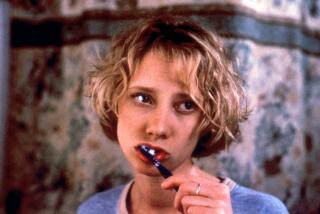RECOLLECTIONS : Don Ameche, Hollywood’s Quiet Man : Movies: He never confused glamour with reality, or thought of acting except as a job to be done as well as you could.
- Share via
The rediscovery of Don Ameche gave heart to everyone who imagined that life and recognition had passed them by. He lent hope to all those who had thought there was nothing left but solitaire and the vacant stare after age 65.
Ameche, who died Monday of cancer at 85, was jokingly known to one generation as the man who invented the telephone. But that was long ago, and several later generations who had never heard of Ameche (nor possibly of Alexander Graham Bell) discovered him as a timelessly suave comic actor in “Trading Places,” when he was already well into his 70s, and shortly thereafter as one of a group of ancients who had themselves lucked onto a kind of vigorous immortality in “Cocoon.”
He himself had seen too much of the world, especially too much of the world of the movies, to be bowled over by the rebirth of his career. He was appreciative of it and as much as anything else amused by it. Ameche took the accolades, including the Oscar as best supporting actor for “Cocoon,” with the grace and dignity that marked his life, and went on being the private, contemplative man he had been for most of his mature years.
When you went to see him in his modest apartment in Santa Monica, before he moved to Arizona, he was at least as eager to talk about theology as about Darryl Zanuck. After one interview, Ameche sent me a copy of Hans Kung’s “Eternal Life? Life After Death as a Medical, Philosophical and Theological Problem,” which he had been discussing. It was not that he had then more than the usual intimations of mortality but simply that it was the kind of reading he found more nourishing than the trade papers.
In the days when the studios each had their rosters of captive stars, he and Tyrone Power and Alice Faye kept 20th Century Fox afloat, in succession to Shirley Temple and Loretta Young. In a good year, he remembered, they made six films apiece.
But, like James Cagney, he never confused glamour with reality, or thought of acting except as a job to be done as well as you could. He had raised a modest amount of hell in his youngest days, but his priorities were always as a family man. He didn’t like the social scene particularly, and still recalled how aghast he was to learn his 4-year-old had gone to a birthday party that cost $24,000 (a sum worth five to 10 times that now).
There was sadness in the private life; his wife became seriously ill and they had been apart for years until she died. It was possible to see his second career as a kind of consolation prize for a long sadness. But his four children were the larger consolation for him.
Don Ameche worked very nearly to the end of his days, adding to a legacy of more than a half-century’s frequently charming work. That is one version of the actor’s dream. And it is nice to speculate that he now knows whether Hans Kung had it right.
More to Read
Only good movies
Get the Indie Focus newsletter, Mark Olsen's weekly guide to the world of cinema.
You may occasionally receive promotional content from the Los Angeles Times.






